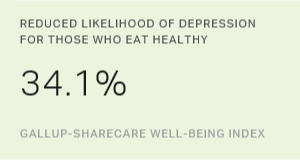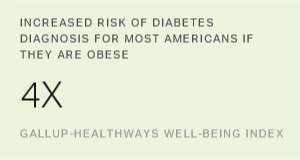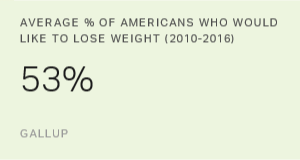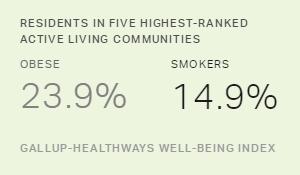Most people think of healthy eating as having the willpower to choose a side salad instead of fries, fruit instead of dessert and small portions instead of big ones. But healthy eating goes beyond just willpower.
New research from the Gallup-Sharecare Well-Being Index, based on more than 177,000 interviews with U.S. adults throughout 2016, has uncovered three hidden factors that could be influencing Americans' eating habits. Focusing on these factors could help people eat healthier, drop excess pounds, and avoid costly chronic diseases such as obesity, diabetes, heart disease and depression:
1. Surround yourself with supportive and health-conscious people.
Gallup-Sharecare research finds a strong relationship between healthy eating and three measures of social support: having someone who always encourages you to be healthy; having friends and family who give you positive energy every day; and having a relationship with a spouse, partner or close friend that is closer than ever. About two-thirds of U.S. adults who agree with these statements reported that they ate healthily the day prior to being interviewed. But among those who disagree with each of these statements, the share of U.S. adults who reported eating healthily dropped to about half.
| Agree (4+5) | Disagree (1+2) | Change | |||||||||||||||||||||||||||||||||||||||||||||||||||||||||||||||||||||||||||||||||||||||||||||||||
|---|---|---|---|---|---|---|---|---|---|---|---|---|---|---|---|---|---|---|---|---|---|---|---|---|---|---|---|---|---|---|---|---|---|---|---|---|---|---|---|---|---|---|---|---|---|---|---|---|---|---|---|---|---|---|---|---|---|---|---|---|---|---|---|---|---|---|---|---|---|---|---|---|---|---|---|---|---|---|---|---|---|---|---|---|---|---|---|---|---|---|---|---|---|---|---|---|---|---|---|
| % | % | pct. pts. | |||||||||||||||||||||||||||||||||||||||||||||||||||||||||||||||||||||||||||||||||||||||||||||||||
| Someone in your life always encourages you to be healthy. | 67 | 48 | -19 | ||||||||||||||||||||||||||||||||||||||||||||||||||||||||||||||||||||||||||||||||||||||||||||||||
| Your friends and family give you positive energy every day. | 66 | 50 | -16 | ||||||||||||||||||||||||||||||||||||||||||||||||||||||||||||||||||||||||||||||||||||||||||||||||
| My relationship with my spouse, partner or closest friend is stronger than ever. | 65 | 52 | -13 | ||||||||||||||||||||||||||||||||||||||||||||||||||||||||||||||||||||||||||||||||||||||||||||||||
| Marginal effects reported (probability of eating healthily) for well-being behavior, controlling for age, gender, marital status, race, income, education, region and employment | |||||||||||||||||||||||||||||||||||||||||||||||||||||||||||||||||||||||||||||||||||||||||||||||||||
| Gallup-Sharecare Well-Being Index | |||||||||||||||||||||||||||||||||||||||||||||||||||||||||||||||||||||||||||||||||||||||||||||||||||
It is unclear from these data whether people who eat healthily are more likely to seek out supportive social relationships, or if those with supportive relationships find it easier to eat healthily. But it seems reasonable that having someone there to offer support and encouragement could make a big difference when trying to stick to a healthy eating plan.
These findings build on those from a famous research study conducted by Nicholas Christakis and James Fowler, which found that good behaviors "spread" within social groups. That research suggests that simply socializing with healthy eaters could lead to better eating habits.
Clearly, it is not always possible to only spend time with people who eat healthily. But communities and workplaces can create social opportunities for healthy eaters and those looking to improve their diets. For example, communities can support farmers markets or community gardens. Workplaces can foster healthy eating with programs that focus on social connections and support, such as sharing nutritious recipes and other healthy eating tips.
Individuals can also take matters into their own hands. They can ask a friend to be an accountability partner or a spouse to provide encouragement as they pursue their healthy eating goals.
2. Find the right career for you.
Finding the right career for you -- whether that is as a worker, student, volunteer, retiree or stay-at-home parent -- can be a powerful motivator for good health.
U.S. adults who agree with three measures of purpose well-being -- reaching most of their goals in the last 12 months, learning or doing something interesting every day, and having a leader who makes them enthusiastic about the future -- are significantly more likely to report eating healthily "yesterday" than those who disagree with those measures.
| Agree (4+5) | Disagree (1+2) | Change | |||||||||||||||||||||||||||||||||||||||||||||||||||||||||||||||||||||||||||||||||||||||||||||||||
|---|---|---|---|---|---|---|---|---|---|---|---|---|---|---|---|---|---|---|---|---|---|---|---|---|---|---|---|---|---|---|---|---|---|---|---|---|---|---|---|---|---|---|---|---|---|---|---|---|---|---|---|---|---|---|---|---|---|---|---|---|---|---|---|---|---|---|---|---|---|---|---|---|---|---|---|---|---|---|---|---|---|---|---|---|---|---|---|---|---|---|---|---|---|---|---|---|---|---|---|
| % | % | pct. pts. | |||||||||||||||||||||||||||||||||||||||||||||||||||||||||||||||||||||||||||||||||||||||||||||||||
| In the last 12 months, I have reached most of my goals. | 69 | 54 | -15 | ||||||||||||||||||||||||||||||||||||||||||||||||||||||||||||||||||||||||||||||||||||||||||||||||
| You learn or do something interesting every day. | 67 | 53 | -14 | ||||||||||||||||||||||||||||||||||||||||||||||||||||||||||||||||||||||||||||||||||||||||||||||||
| There is a leader in your life who makes you enthusiastic about the future. | 67 | 55 | -12 | ||||||||||||||||||||||||||||||||||||||||||||||||||||||||||||||||||||||||||||||||||||||||||||||||
| Marginal effects reported (probability of eating healthily) for well-being behavior, controlling for age, gender, marital status, race, income, education, region and employment | |||||||||||||||||||||||||||||||||||||||||||||||||||||||||||||||||||||||||||||||||||||||||||||||||||
| Gallup-Sharecare Well-Being Index | |||||||||||||||||||||||||||||||||||||||||||||||||||||||||||||||||||||||||||||||||||||||||||||||||||
It is possible that having a strong sense of purpose drives healthy eating habits, or that healthy eating habits provide the energy for someone to achieve their goals and make each day interesting.
Regardless of the direction of the relationship, it seems plausible that having a strong sense of purpose could give someone a compelling reason to want to eat healthily and live their best possible life.
Discovering your "why" and keeping a reminder of it visible, such as on the refrigerator or on your desk at work, could give someone the extra push to sustain healthy eating habits.
3. Get your finances in order.
Research has shown that long-term stress can cause a spike in stress hormones that lead people to overeat and choose foods higher in fat or sugar. Unfortunately, finances are one of the biggest stressors for many Americans. Gallup has found that a majority of Americans worry about financial issues, including having enough money to retire, to pay unexpected medical expenses and to maintain their standard of living.
Gallup and Sharecare research also finds that those who agree they have enough money to do everything they want to do are significantly more likely to report eating healthily "yesterday" than those who disagree.
| Agree (4+5) | Disagree (1+2) | Change | |||||||||||||||||||||||||||||||||||||||||||||||||||||||||||||||||||||||||||||||||||||||||||||||||
|---|---|---|---|---|---|---|---|---|---|---|---|---|---|---|---|---|---|---|---|---|---|---|---|---|---|---|---|---|---|---|---|---|---|---|---|---|---|---|---|---|---|---|---|---|---|---|---|---|---|---|---|---|---|---|---|---|---|---|---|---|---|---|---|---|---|---|---|---|---|---|---|---|---|---|---|---|---|---|---|---|---|---|---|---|---|---|---|---|---|---|---|---|---|---|---|---|---|---|---|
| % | % | pct. pts. | |||||||||||||||||||||||||||||||||||||||||||||||||||||||||||||||||||||||||||||||||||||||||||||||||
| You have enough money to do everything you want to do. | 69 | 57 | -12 | ||||||||||||||||||||||||||||||||||||||||||||||||||||||||||||||||||||||||||||||||||||||||||||||||
| Marginal effects reported (probability of eating healthily) for well-being behavior, controlling for age, gender, marital status, race, income, education, region and employment | |||||||||||||||||||||||||||||||||||||||||||||||||||||||||||||||||||||||||||||||||||||||||||||||||||
| Gallup-Sharecare Well-Being Index | |||||||||||||||||||||||||||||||||||||||||||||||||||||||||||||||||||||||||||||||||||||||||||||||||||
It is possible that those with enough money to do everything they want to do may have more access to healthy food. But it is also possible that people who manage their money don't have as much financial stress -- stress that could result in unhealthy eating habits.
While having some financial stress is normal, the key is to manage it so that it doesn't affect other areas of life, like eating habits. Simply having a budget and long-term financial plan in place to pay off debt, save for retirement and meet other goals can reduce undue financial stress.
An added bonus: cooking healthy meals at home could be less expensive than frequently eating out at restaurants, allowing people to boost both their health and their wallets.
With obesity, diabetes and depression rates at all-time highs, it is clear Americans need new strategies to improve their eating habits. Seeking out strong social support, identifying a strong purpose in life and reducing financial stress could help Americans make lasting changes that will reduce chronic illness and improve the well-being of people across the country.
Read more about healthy eating in the "Gallup-Sharecare 2016 Community Rankings for Healthy Eating" report.
Survey Methods
Results are based on telephone interviews conducted Jan. 2-Dec. 30, 2016, as part of the Gallup-Sharecare Well-Being Index survey, with a random sample of 177,192 adults, aged 18 and older, living in all 50 U.S. states and the District of Columbia. For results based on the total sample of national adults, the margin of sampling error is ±0.28 percentage points at the 95% confidence level. All reported margins of sampling error include computed design effects for weighting.
Each sample of national adults includes a minimum quota of 60% cellphone respondents and 40% landline respondents, with additional minimum quotas by time zone within region. Landline and cellular telephone numbers are selected using random-digit-dial methods.
Learn more about how the Gallup-Sharecare Well-Being Index works.



